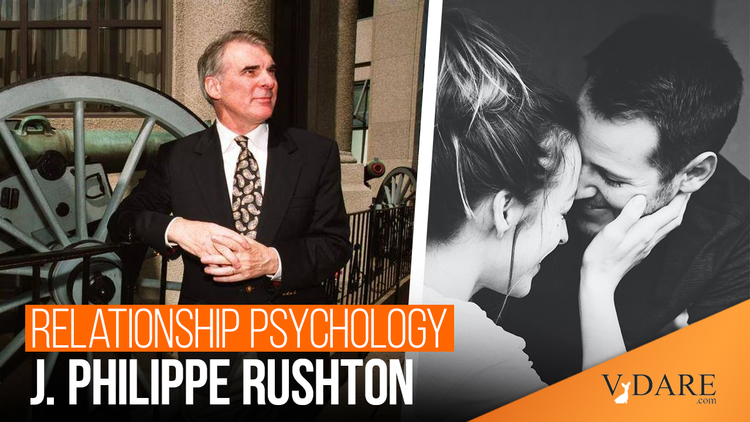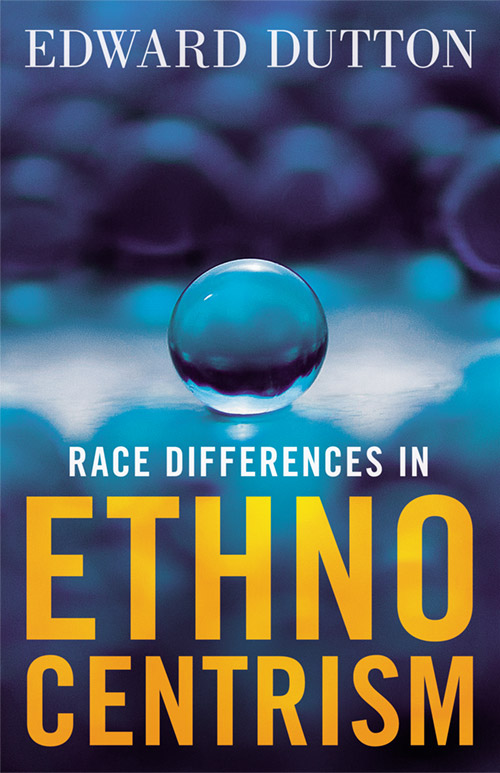
“Mate Copying” Study Shows That Rushton Was Right! … But Authors Zhang, Anderson Too Cowardly To Admit It
01/27/2023
I’ve long been fascinated by the “controversial” British-Canadian psychologist J. Philippe Rushton (1943-2012), to the extent that I wrote the only book-length (by no means uncritical) biography of him: J. Philippe Rushton: A Life History Perspective. It’s equally fascinating to see a new study which, in essence, proves him correct — but whose authors cannot possibly bring themselves to publicly admit this, because Rushton is just too “controversial.”
Just such a study was recently published in the occasionally daring scholarly journal Evolutionary Psychological Science. Entitled “Exploring the Influence of Race in Mate Copying Using Former Partner Evaluations,” the study, by Australian evolutionary psychologists Joseph Zhang and Ryan Anderson, focuses on the intriguing issue of “mate copying” — the tendency, especially strong in females, to choose a mate who has already proven popular with the opposite sex. But as you read it, you find that Rushton’s ghost looms large over it.
“Mate Copying” is engaged in to a greater extent by females than males, because females sexually select, to a greater extent than males, for socioeconomic status and willingness to commit to offspring among other more “psychological” traits. Males have less to lose from a relationship that goes wrong — they won’t be left with the baby — so they tend to focus more on cues of health and youth.
“Dating,” according to the authors, is the means by which females find the most appropriate partner for them. But this is a “costly process”: spending time with relative strangers involves risk and is expensive in terms of time. So females will speed up the process via “mate copying.”
If a male already has a female partner, then this proves there is something good about him, so some females may “mate poach.” Of course, this is also a high risk strategy, but, even if they avoid it, they will find males more attractive if these males have recently been in a relationship with a female.
Not only that, but the males will be even more attractive the higher their status and the more attractive the former (or current) female partner is. If the female is of low status and is unattractive, then this will reduce the attractiveness of the target male. But the mere presence of a female near a male — even if not his girlfriend or former girlfriend — is sufficient to increase his attractiveness from the perspective of single females. Interesting conclusion: It makes sense for males to cultivate groups of attractive and high status female friends.
Before we get on to how the researchers tested this, it’s worth knowing more about Rushton’s theory. Two interrelated theories of his are relevant to this study, though neither is mentioned:
- Genetic Similarity Theory.
We pass on our genes directly — via having children — but also indirectly, by aiding those who are genetically relatively similar to ourselves. For this reason, best friends and, to an even greater extent, romantic partners tend to be more genetically similar to each other than chance would predict.
Procreating with a person who is relatively genetically similar allows us to pass on more of our genes. It also means we will bond more strongly both with our partner and the offspring.
This theory also helps to explain why people tend to be more attracted to members of their own race, with races being genetic clusters — see Ethnic Nationalism, Evolutionary Psychology and Genetic Similarity Theory, by J. Philippe Rushton, in the journal Nations and Nationalism, 2005.
Zhang and Anderson put this down to environmental factors such as early imprinting and do not even discuss Rushton’s theory. But if Zhang and Anderson were correct, then couples would be about equally similar on all phenotypic traits. In reality, as Rushton sets out in his Nations and Nationalism essay, similarity is higher the more heritable the genetic trait is.
Rushton’s second important theory:
- Differential-K
This is the idea that blacks, whites and East Asians sit on a “Life History Speed” spectrum, with blacks the fastest and East Asians the slowest.
Evolved to an unstable yet easy environment, blacks need to pass on their genes quickly. So they invest proportionately more their energy in copulation and relatively little in nurture.
In contrast, adapted to stable yet harsh and competitive environment, East Asians must strongly nurture a small number of offspring so that any survive at all. Thus, East Asians invest proportionately more of their energy in nurture.
Whites are intermediate but closer to East Asians.
Rushton developed this in his 1995 book Race, Evolution and Behavior: A Life History Perspective.
For Zhang and Anderson,
East Asian cultures display what is referred to as ‘in-group derogation’ … the tendency for some collectivist cultures to assess their in-group members as less favorable [i.e., more critically] compared [what happens in] to individualist cultures.
However, this strong East Asian focus on “correct behavior” would be in line with Rushton’s theory of East Asian cultures valuing nurturers and, so, pro-social people.
So, what did Zhang and Anderson do to test their broader hypothesis on Mate Copying? They presented a sample of 461 Australian women (they were mainly White but there was a minority of East Asians and blacks) with photographs of “target males” who were white, black or East Asian. These were paired with descriptions by former female partners “evaluating the target man either positively or negatively.” They also controlled for racial similarity in some of the experiments.
The result: When people were more racially dissimilar to the “target male,” they adjusted their evaluations of attractiveness more when they learnt information about the target male provided by a former partner. This implies that they were making a “trade-off” between genetic similarity and attractive psychological traits.
But this worked differently with East Asians. Those who were more racially similar to the East Asian “target male” adjusted their ratings more upon discovering information about him from former partners. This was particularly pronounced in response to negative information. This would imply, in line with Rushton’s theory, that East Asian females very strongly value nurture and also that they are very high in ethnocentrism, causing them to judge miscreants of their own race with particular harshness. I have presented evidence for race differences in ethnocentrism — with East Asians being highly ethnocentric — in my 2019 book Race Differences in Ethnocentrism.

The black target male was evaluated in slightly different ways, due to the small number of Blacks in the experiment, making comparison difficult. But, in essence, racially dissimilar females adjusted their evaluations more in the light of negative information, while racially similar females adjusted it more in the light of positive but not negative information. This might imply that black females tend to care less than white females about being abandoned — which is what Rushton’s model would predict.
But, especially with regard to whites and East Asians, we have a study which further shows the correctness of two of J. Philippe Rushton’s theories. Yet Rushton is completely ignored in the study.
In a subtle way, this Cancellation of a highly explanatory scientific theory because Woke academia dislikes the man who thought of it is yet another indicator that all is far from well in the world of science.
From the cancellation of Emil Kirkegaard, to leftist scholars falsifying research to back up their dogmas, Western Science seems to be ever more ideologically dominated by the day.
It’s just further evidence that we are now in a new Dark Age.
Edward Dutton (email him | Tweet him) is Professor of Evolutionary Psychology at Asbiro University, Łódź, Poland. You can see him on his Jolly Heretic video channels on YouTube and Bitchute. His books are available on his home page here.
